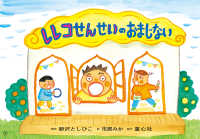Full Description
New Voices for Old Words is a collection of previously unpublished Algonquian oral traditions featuring historical narratives, traditional stories, and legends that were gathered during the late nineteenth and early twentieth centuries. The collection presents them here in their original languages with new English-language translations. Accompanying essays explain the importance of the original texts and their relationships to the early researchers who gathered and, in some cases, actively influenced these texts.
Covering the northeast United States, eastern Canada, the Great Lakes region, and the Great Plains, the Algonquian languages represented in New Voices for Old Words include Gros Ventre, Peoria, Arapaho, Meskwaki, Munsee-Delaware, Potawatomi, and Sauk. All of these languages are either endangered or have lost their last speakers; for several of them no Native text has ever been published. This volume presents case studies in examining and applying such principles as ethnopoetics to the analysis of traditional texts in several languages of the Algic language family. These studies show how much valuable linguistic and folkloric information can be recovered from older texts, much of it information that is no longer obtainable from living sources. The result is a groundbreaking exploration of Algonquian oral traditions that are given a new voice for a new generation.
Contents
Contributors
Foreword
Introduction
DAVID J. COSTA
Editing a Gros Ventre (White Clay) text
TERRY BROCKIE AND ANDREW COWELL
Gros Ventre text:
The Gros Ventres Go to War
Redacting Premodern Texts without Speakers: the Peoria Story of
Wiihsakacaakwa
DAVID J. COSTA
Peoria text:
Wiihsakacaakwa Aalhsoohkaakani (Wiihsakacaakwa Story)
Editing and Using Arapaho-Language Manuscript Sources: A
Comparative Perspective
ANDREW COWELL
Arapaho texts:
A Name-Changing Prayer
Nihʼoo3oo and His Friend the Beaver Catcher: Diving
through the Ice
Highlighting Rhetorical Structure through Syntactic Analysis: An
Illustrated Meskwaki Text by Alfred Kiyana
AMY DAHLSTROM
Meskwaki text:
A Man Who Fasted Long Ago
Three Nineteenth-Century Munsee Texts: Archaisms, Dialect
Variation, and Problems of Textual Criticism
IVES GODDARD
Munsee texts:
A Youth and His Uncle
Moshkim
Origin Myth
On Editing Bill Leaf's Meskwaki Texts
LUCY THOMASON
Meskwaki text:
Bill Leaf's Story of Red-Leggins
Challenges of Editing and Presenting the Corpus of Potawatomi
Stories Told by Jim and Alice Spear to Charles Hockett
LAURA WELCHER
Potawatomi text:
Jejakos Gigabé (Crane Boy)
The Words of Black Hawk: Restoring a Long-Ignored Bilingual
GORDON WHITTAKER
Sauk text:
The Nekanawîni ('My Words') of Mahkatêwimeshikêhkêhkwa
Index








